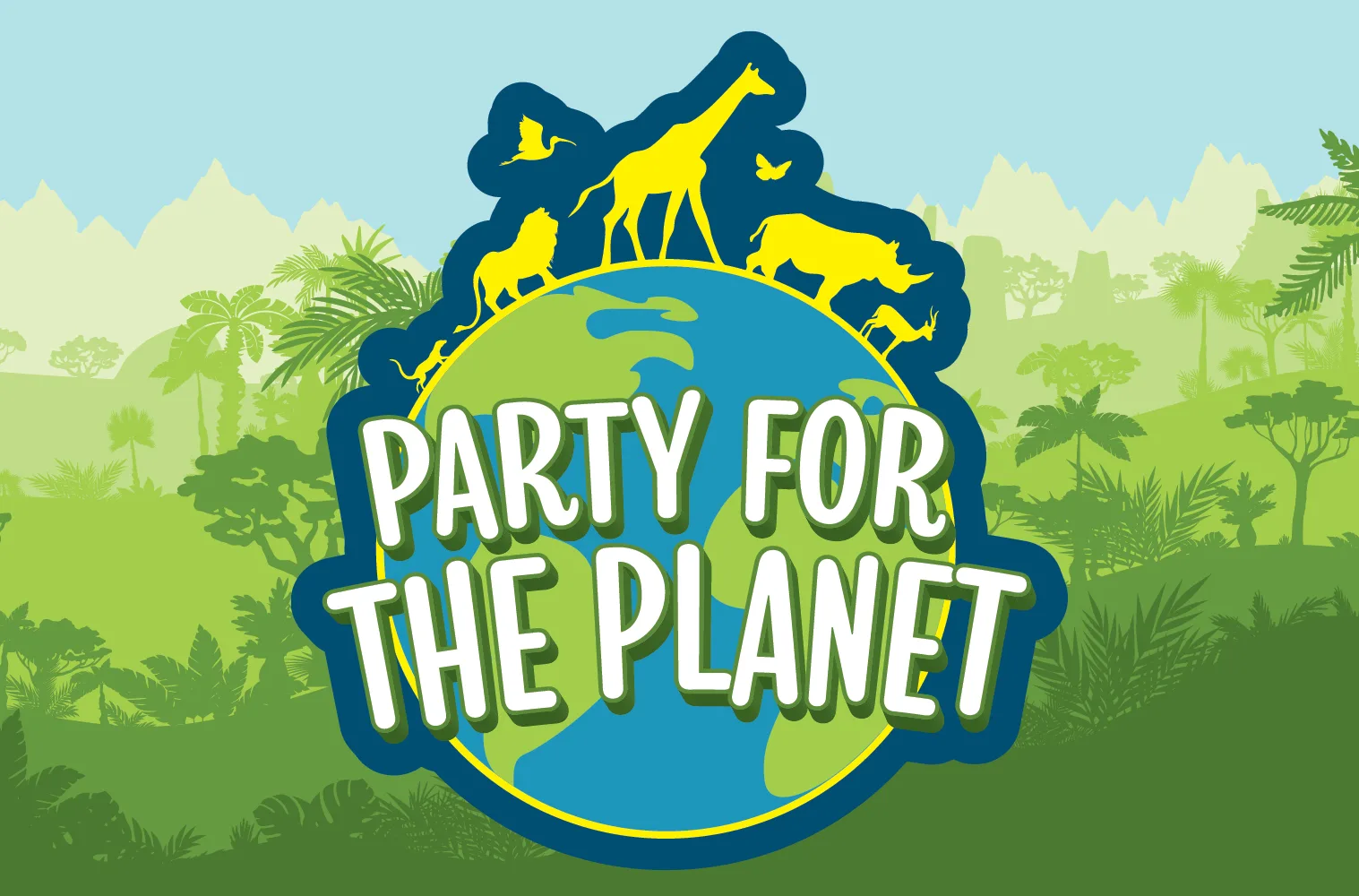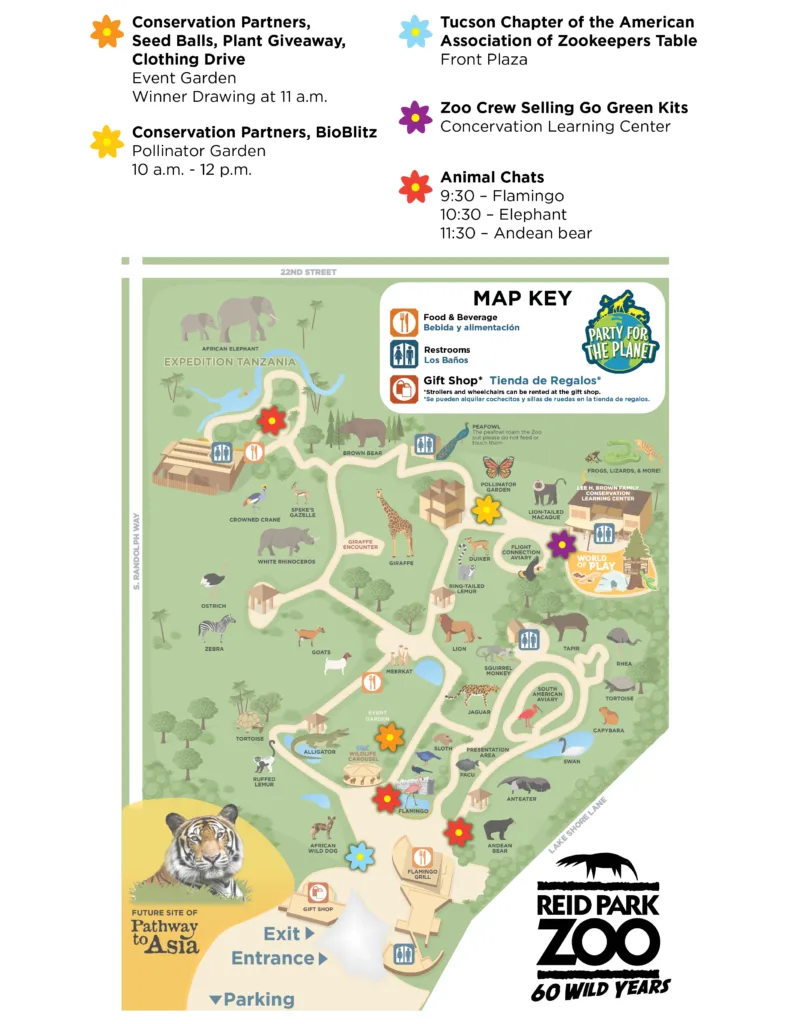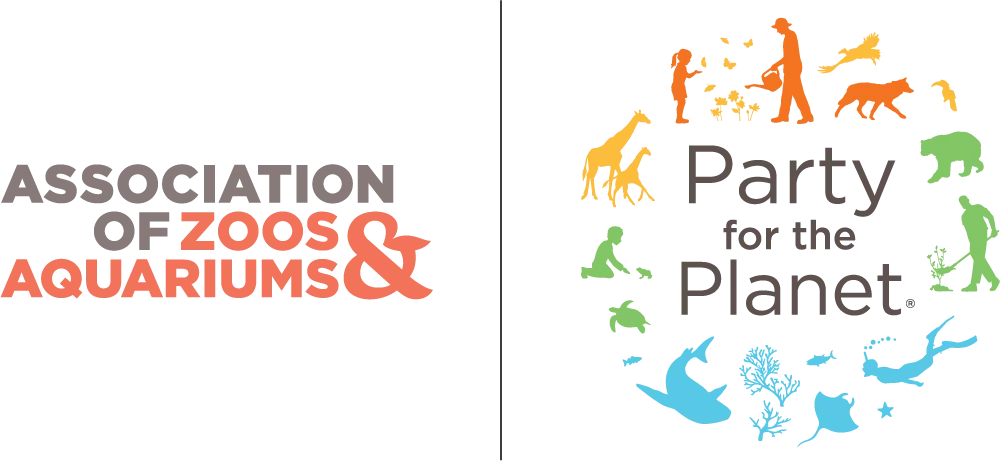Party for the Planet 2025
Sunday, April 27, 2025
9 a.m. – noon

Join Reid Park Zoo for a Party for the Planet! From 9 a.m. – noon, learn about the conservation efforts the Zoo supports around the world, as well as in southern Arizona. Talk to local conservation partners about their work in our community and how you can make everyday choices to help wild animals and wild places right here around Tucson. Reduce clothing going to the landfill by bringing gently used clothing with you to the Zoo for a clothing drive hosted by Goodwill Industries of Southern Arizona.
During the event:
- Enjoy Animal Chats and docent stations
- Participate in a Zoo-wide BioBlitz using iNaturalist from 10 a.m. – noon (observations made during the BioBlitz are part of the City Nature Challenge 2025)
- Make native wildflower seed balls to take home (while supplies last)
- Enter for a chance to win a native plant from Nighthawk Natives Nursery (drawing at 11 a.m.)
- Purchase a Go Green kit from Reid Park Zoo’s Zoo Crew teen volunteer program to help you “go green”
- Visit the Tucson chapter of the American Association of Zookeepers table to check out Zoo animal stickers for sale
- Donate gently used clothes to the Goodwill Industries of Southern Arizona clothing drive
Learn more about our Local Conservation Partners below!
- Goodwill Industries of Southern Arizona
- Nighthawk Natives Nursery
- City of Tucson Environmental Services
- University of Arizona Compost Cats
- Pima County Dept of Environmental Quality
- Pima County Dept of Conservation Lands & Resources
- Southwest Monarch Study
- Xerces Society
- Tucson Bird Alliance
- Sabino Canyon Volunteer Naturalists
- Pima County Master Naturalists
- Las Milpitas Community Farm
- American Association of Zoo Keepers (Tucson AAZK)
- Watershed Management Group
- Friends of the Pima County Public Library
- Living Desert Alliance
- Governor’s Youth Commission Conservation and Sustainability Workgroup
Check out Reid Park Zoo’s Conservation efforts here. Keep the Party going all year by checking out the actions you can do at home below.


Keep the Party Going all Year-long!
Choose one or more of these actions to help us protect wild animals and wild places.
Donate your approved browse to the Zoo. Did you know Reid Park Zoo has a Browse Program for our large herbivores? Donating browse to the Zoo reduces the amount of tree trimmings going to the landfill, plus the animals at the Zoo LOVE fresh browse. Learn more about our browse donation program HERE.
Plant native plants in your yard. Native plants provide natural sources of food and shelter for native wildlife. Bonus, native plants are better adapted to our hot, dry climate so they need less water and are easier to maintain. Find a list of plants native to your using a database like the one by the National Wildlife Federation, National Audubon Society, or the Arizona Native Plant Society. You can even certify your garden as a wildlife habitat through the National Wildlife Federation.
Avoid the use of pesticides. Pesticides and herbicides are harmful to pollinators and birds. Make sure any plants and seeds you purchase were not coated in neonicotinoids, or “neonics”. Local plant nurseries are good places to purchase plants. Nighthawk Natives Nursery supplied the local plants for the Party for the Planet plant giveaway.
Reduce Artificial Light at Night (ALAN). Many birds and other wildlife migrate at night. Artificial light can draw them closer to buildings and cause them to tire and become disoriented. Help them migrate successfully by closing curtains at night and only using outdoor light that is necessary, directed downward, and motion-activated so it only turns on when needed. Learn more at https://darksky.org/.
Make your windows bird-safe. Birds do not see glass as a barrier, especially when outdoor plants are reflected in it. Make your windows visible to birds by applying patterns that are spaced no more than 2 inches by 2 inches apart (so the bird doesn’t try to fly between the pattern). Decals do not work unless they are very close together. Check out available options at https://abcbirds.org/solutions/prevent-home-collisions/.
Remember the 4 R’s (Refuse, Reduce, Reuse, and Recycle). Refuse single use plastic like grocery bags, straws, and single use water bottles. Reduce your use of mined resources like lithium (which impacts flamingo habitat) by only replacing electronics when they no longer work. Reuse gently used clothing by purchasing clothing second-hand, and donating clothing you no longer wear for resale. Recycle properly by following the policy of your community. Check out this City of Tucson Recycling Flyer to learn what and how to recycle in Tucson city limits.
Compost your food waste (the 5th R = Rot). Instead of going to the landfill, food scraps can be composted. Many people have backyard compost piles but you can compost your food waste even if you don’t have a big yard by participating in the City of Tucson’s FoodCycle At Home program. Learn more about the program and sign-up to join a workshop near you. At the workshop, you will receive a countertop compost bucket and list of drop off locations around the city.
Make Sustainable Shopping Choices. All species rely on a healthy habitat. We can help protect habitats around the world by making sustainable shopping choices. Use apps like Palm Oil Scan, websites like Seafood Watch, and look for labels such as Smithsonian Bird Friendly, Rainforest Alliance, and Fair Trade to make your choice easier. Look for items made with post-consumer recycled plastic and paper.
Be Water Wise. Fix leaky faucets and install low flow fixtures to save water (and money). Consider harvesting rainwater during monsoon season to use for watering plants year-round. Learn more about how to conserve water in the desert with the Watershed Management Group.
Become a Community Scientist. Community Science (also called citizen science) programs allow us to make observations that help scientists around the world protect wild animals and wild places. Use iNaturalist or eBird when exploring the backyard or neighborhood, or check out SciStarter to learn about community science projects around the world, and even some you can do from your couch!
